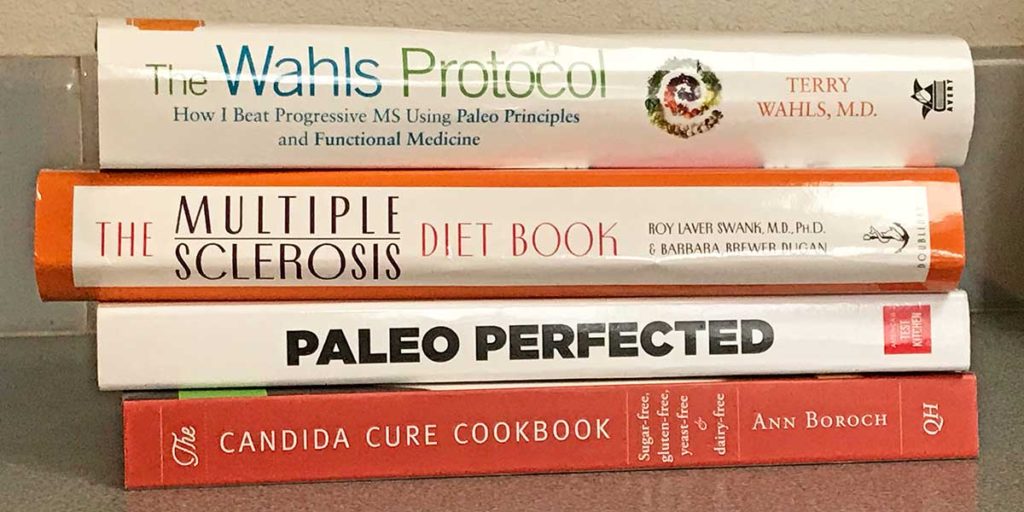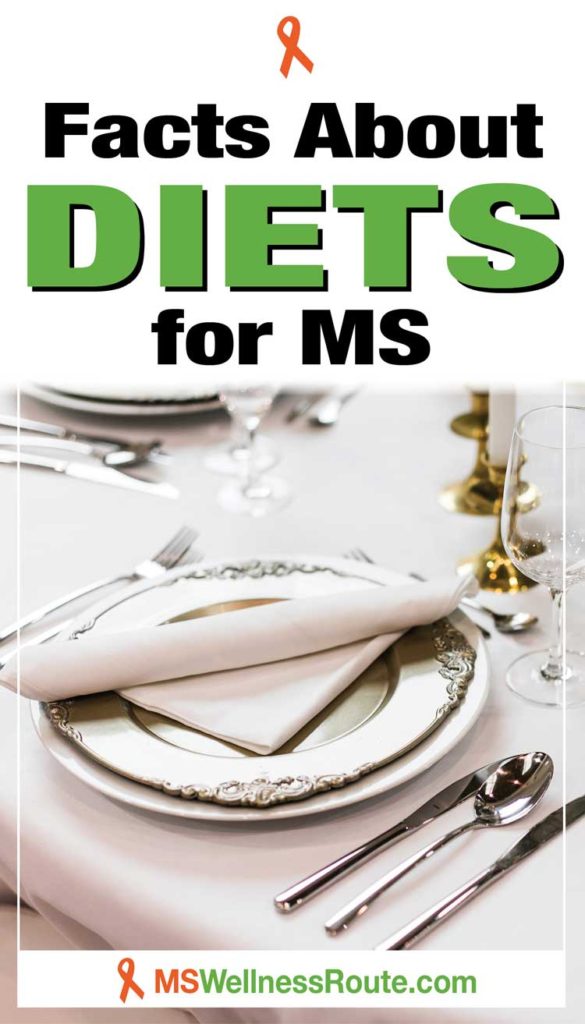Last Updated on November 18, 2023 by Cathy

Multiple sclerosis (MS) is a chronic inflammatory disease of the central nervous system. Researchers believe it is caused by genetic predisposition and environmental factors including gut health. Although it is not mentioned when first diagnosed, diet and nutrition play a huge role in managing MS.
There are many genes associated with MS. The HLA-DRB1*15:01 is the strongest and one on the X chromosome. That may explain why women are three times more likely to have MS compared to men.
Biological females have two X chromosomes (XX). Biological males only have one X chromosome (XY).
However, genetics plays a small role, it’s the environmental factors that cause the onset of MS. Researchers discovered this when they studied identical twins. The odds of both identical twins having MS is a 30% chance.
This means 70% is due to environmental factors. Such as exposure to infectious agents or smoking. It also includes your diet. There are many diets for MS but there is no “MS diet” in particular that helps everyone.
Popular diets for MS include:
- Autoimmune Protocol (AIP)
- Best Bet Diet (BBD)
- McDougall diet
- Mediterranean diet
- Overcoming MS diet (OMS)
- Paleolithic diet (paleo)
- Swank diet
- Wahls Protocol (paleo-based)
Although these diets are different they all have something in common. And that is lowering inflammation. Diet plays a huge role in preventing and managing chronic diseases including MS.
Conventional doctors and nutritionists see diet as an “alternative treatment.” It should be the other way around. Pharmaceutical drugs should be the alternative treatment, not diet.
Diets for MS Is Not New

This is an old stove from my dad’s kitchen.
Using diet to manage MS is not new, people have been using diet to help manage MS for decades.
In 1948, Dr. Roy Swank introduced a low-fat diet for people with MS. He discovered certain regions of Norway had more cases of MS than other areas. The difference was the way they ate.
In areas where there were more people with MS, they ate more animal fats (saturated fats). People without MS ate more oils from plants and fish (unsaturated fats). – This was over 70 years ago!
Roger MacDougall, a Scottish playwright, was diagnosed with MS in 1953. Within a few years, he was unable to use his eyes, fingers, and legs. By eating a hunter-gatherer diet he was able to reverse his MS and run up and downstairs again.
Quotes from PubMed about Diets for MS
Here are several quotes from different studies found on PubMed (a U.S. health database):
“nutrition should be placed at the forefront.”
“Diet and exercise throughout the life course can reduce the threat of a global epidemic of chronic diseases.”
“better quality of diet, as well as not consuming meat, were associated with reduced disability progression in people with MS.”
“Nutrition is considered to be a possible factor in the pathogenesis of the neurological disease MS.”
“dietary patterns based on the traditional concept of food nature might be associated with the risk of developing MS.”
“Both diets were associated with clinically meaningful within-group reductions in fatigue and improvements.” (Talking about Swank and Wahls diets.)
“likelihood of higher disability when compared to respondents with a ‘poor’ diet.”
“adequate intake of food groups and nutrient supplementation during adolescence may be effective in reducing adult-onset PPMS risk.”
“These treatments are not able to stop the destruction of nerve tissue.”
“patients with MS often have an imbalance between macronutrients intake”
You can find links to each of these studies at the bottom of this article. There are many more studies not listed here. If you want to learn more search PubMed for diet and MS. Many studies are proving a healthy diet benefits MS. However, they still consider diet as “inconclusive.”
Conventional doctors would rather see their patients on one of the MS drugs. MS drugs are not a cure, if they work they only slow the disease down. Plus, they come with nasty side effects such as brain disease (PML), heart and liver damage, and death.
Best Diets for MS

Since everyone is different there is no perfect diet for MS. Overall, people with MS should avoid heavily processed foods. And eat a well-balanced, high-fiber diet. People with MS are usually deficient in vitamin D so they should include foods high in vitamin D such as salmon.
Depending on which diet you choose to follow start with a diet that lowers inflammation. Then adjust the diet depending on your particular needs. Nutritionists generally say you need to include whole grains, dairy, and legumes. This may not be accurate. For example, studies found dairy “was highly significant” when it came to MS.
“Women who consumed whole milk 3 or more times per day had a 47% increased risk of developing MS” – PubMed
Here is a study on neurodegenerative diseases and gluten:
“Gluten might be a potential detrimental nutrient in neurodegenerative diseases evolvement.” – PubMed
Gluten creates a leaky gut which is a condition where the lining becomes damaged. This allows bacteria, undigested food, and toxins to pass into the bloodstream. It also activates zonulin which further damages the gut lining.
“Zonulin concentrations were significantly higher in MS patients” – PubMed
Legumes contain a sticky protein called lectin. Plants use it to defend themselves from insects eating them. Most people don’t have a problem eating legumes. But for people with an autoimmune disease, lectins are difficult to digest. This leads to imbalanced gut flora and leaky gut.
“Leaky gut syndrome contributes to autoimmune diseases” – PubMed
What to Eat on an MS Diet

It is well known that vitamin D plays a significant role in MS. Not only causing the onset of MS but also the progression of the disease. It’s not only vitamin D but all vitamins and minerals.
Eating a wide variety of foods will ensure your body is getting important nutrients. Vitamin D is in some foods such as egg yolks and salmon but it isn’t enough. That’s why it is important to take a supplement such as Vitamin D by Thorne.
Everyone absorbs vitamin D differently. It is important to get tested to find your starting point. 600 IU I’d the recommended dose however, for a person with MS it will be much higher depending on your blood work.
To learn more about vitamin D read: Multiple Sclerosis And Vitamin D
Always talk to your doctor before starting a supplement.
Quality of Life
There is no “cure” for MS but eating a diet that lowers inflammation benefits your overall health. Such as cardiovascular disease, gastrointestinal disorders, hypertension, and type 2 diabetes.
“To overcome silent inflammation requires an anti-inflammatory diet” – PubMed
Managing MS will give you a better quality of life until there is a cure.

Free Wellness Library!
Subscribe for free and I’ll send you the password to my secret library filled with many printables for your wellness journey.
Want to remember this health tip? Pin it to your Pinterest board!

Resources:
Multiple Sclerosis: Pathogenesis, Symptoms, Diagnoses and Cell-Based Therapy
The nature of genetic and environmental susceptibility to multiple sclerosis
Diet, nutrition and the prevention of chronic diseases
Higher-quality diet and non-consumption of meat
Navigating dietary advice for multiple sclerosis
Association between multiple sclerosis and dietary patterns…
Impact of the Swank and Wahls elimination dietary interventions…
The association of diet with quality of life, disability, and relapse
Dietary risk factors of primary progressive multiple sclerosis
Multiple Sclerosis: Pathogenesis, Symptoms, Diagnoses and Cell-Based Therapy
The Role of Diet in Multiple Sclerosis…
“Let Food Be Thy Medicine”: Gluten and Potential Role in Neurodegeneration





